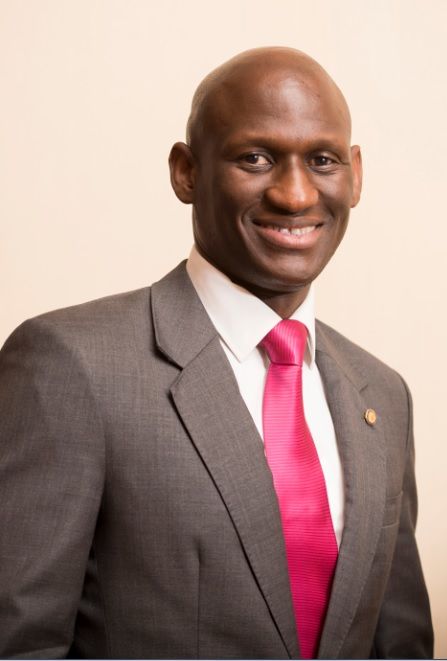General News
Developing Successful Future: Why Coding Is Essential For Today’s Students

By Hakeem Adeniji- Adele, Microsoft Nigeria, Chief Technology Officer
With five million jobs set to be lost to automation by 2020 and 80 percent of the jobs in 2025 not yet existing, how do we set up today’s students for success tomorrow?
ICT education as part of a school curriculum is nothing new. For the past couple of decades students have been learning how to word-process or work a spreadsheet.
But in 2017, that’s no longer enough. It’s evident that learning new and more relevant digital skills is vital if we are to survive and thrive in a world increasingly dominated by technology.
The curriculum that must guide our students successfully into the jobs of the future must focus on computer science, information technology and digital literacy. Integral to this is teaching them how to code; learning not just how to work a computer, but how a computer works and how to make it work for them.
Building Skills For Any Career
There’s so much more to coding than finding a job as a developer one day. Learning coding skills benefits students whatever their ultimate career – similar to the argument of teaching a child to play a musical instrument or speak a foreign language. We’re not only trying to encourage students to become developers, but also encouraging them to be creative and think differently.
Coding teaches both critical and computational thinking, which help develop students’ problem-solving skills. It also gives them a sense of independence, which is encourages innovation and entrepreneurship.
Mining The Right Digital Tools For The Classroom
Minecraft: Education Edition makes the idea a reality. In simple terms, it’s a computer game about placing blocks to create the simplest shelter or grandest castle, and going on adventures in randomly generated worlds. Minecraft has already been used in classrooms for years to help students learn more about maths, humanities, history and physics, and has helped build their digital literacy skills.
The game gives students in classrooms in more than 100 countries the freedom to be creative, while inspiring problem solving and critical thinking, and encouraging collaboration as students work together in their virtual worlds. It also offers teachers the tools they need to understand the game and monitor their students’ usage and progress – because technology is meaningless without the right teacher to use it effectively.
To add to this, the newCode Builder for Minecraft: Education Edition makes it easy for teachers and students to dive into coding within the world of Minecraft.
Code Builder introduces the Agent – a virtual sidekick who executes coding instructions the player gives via learn-to-code programs like Tynker, MakeCode and ScratchX. This makes it easy for students to understand the principles of coding, by learning how to use it to get the Agent to build things and solve problems that have an immediate impact on the game.
Coding Is The New Literacy
The findings of a recent Microsoft survey, released at BETT Middle East earlier this year, show that the majority of teachers see virtual collaboration as a key skill required by students, followed by problem solving and knowledge construction.
A further 39 percent believe students will be limited in terms of career options due to a lack of digital literacy. With the world experiencing seismic shifts in the way we live and work, there is no doubt that coding is the new literacy.
The great thing about learning to code is that it embodies the idea that sometimes learning can effective when you’re not aware you’re learning – you you’re just having fun. Ultimately, that fun translates into a set of skills and a way of thinking that will help today’s students make a success of tomorrow.
To help teachers get ready for the new school year, Microsoft are hosting “Back to School LIVE,” an interactive set of online workshops, TweetMeets and tips to get the most out of new products like Minecraft: Education Edition.
General News
NGF Launches Digital Platform to Bridge $100bn Infrastructure Gap

The Nigeria Governors’ Forum (NGF) has launched a digital platform to attract local and international investors to Nigeria’s sub-national infrastructure projects and close the country’s estimated $100 billion annual financing gap.

Unveiled in Abuja, Investopedia will serve as a transparent “one-stop shop” for investment opportunities across Nigeria’s 36 states, said the forum, offering detailed project information and clear entry points for prospective investors.
NGF chairman and Kwara State Governor, Abdulrahman Abdulrazaq, described the initiative as a “strategic tool to unlock Nigeria’s full potential by mobilising global and African capital for critical infrastructure”.
He stressed that the platform should be seen as more than an investment catalogue, but a gateway that combines opportunities with guidance and institutional oversight.
Investopedia is backed by partnerships with the African Export-Import Bank (Afreximbank), the United Nations Development Programme (UNDP), and the Ministry of Finance Incorporated (MOFI).
NGF director-general, Abdulateef Shittu, hailed the launch as a “new dawn” for sub-national investment readiness, noting that Nigeria attracted only $1.87 billion in foreign direct investment in 2023, well below Africa’s average.
By curating a pipeline of bankable projects, he said the platform would boost investor confidence and expand Nigeria’s global visibility.
Shittu added that beyond financing, the platform would foster technical partnerships, capacity-building, and risk mitigation, laying the groundwork for sustainable economic growth.
“This is about more than funding, it is about actionable, bankable projects that will drive jobs, inclusive growth, and long-term prosperity,” he said.
General News
IHS Nigeria, Osun State partner to transform technical education

IHS Nigeria has partnered with the Osun State Government on Osun Teacher-Shift 2025, a programme aimed at transforming technical and vocational school teachers into digital-ready educators capable of driving innovation in classrooms.

The IHS Nigeria sponsored initiative, implemented by Focus Teens Foundation in collaboration with the Osun State Board of Technical and Vocational Education, targets about 200 teachers across the State’s nine technical colleges. The training will run in batches over a two-day period, with participants expected to acquire modern skills, and innovative teaching techniques.
Speaking at the opening ceremony which held in Osogbo yesterday, Titilope Oguntuga, Director of Sustainability at IHS Nigeria, explained that the project was developed to prepare teachers for the opportunities and challenges of a fast-evolving world.
She said, “Today is not just the launch of a programme — it is the beginning of a movement. This is more than training, it is a mindset shift. It is about rethinking how we prepare teachers, students, and our communities for the opportunities and challenges of a fast-evolving world.”
Oguntuga emphasised that teachers remain at the centre of national development but face increasing demands to inspire creativity, nurture innovation, and equip young people with practical and technology-driven skills.
She noted that the initiative also reflects IHS Nigeria’s four sustainability pillars — ethics and governance, environment and climate change, people and communities, and education and economic growth.
The IHS official said, “education remains the strongest catalyst for national development. But we cannot achieve this without empowering the people who will empower the next generation. With this programme, teachers and beneficiaries from the nine technical colleges will begin to think more innovatively and incorporate new systems that support STEM for the advancement of our nation.”
Oguntuga added that each school would be given routers with one year subscription.
Adedapo Ademola-Adesina, Special Adviser to the Governor on Technical and Vocational Education, noted that the State Government believes in private sector collaboration to achieve its goals for technical and vocational education, leading to the partnership with IHS Nigeria.
“We must begin by changing the mindset of our teachers. They are the ones who shape future leaders. That is why we tagged the program “Osun Teacher-Shift 2025” — shifting from the old ways to new digital teaching”, he said.
Also speaking, Sunday Eluwole, the Osun State Commissioner for Education, acknowledged that the training was both timely and necessary, saying; “this is the 21st century, and Nigeria cannot be left behind. Our schools, teachers, and classrooms must be digitalised. Teachers must first be trained in digital methods before they can pass the knowledge on to students.”
Eluwole added that Osun State, which has the highest number of technical colleges in the Country, is committed to making its schools models of digital and vocational learning.
Earlier, Muritala Jimoh, Permanent Secretary, Ministry of Education, said that Osun State teachers are ready to shift. Jimoh noted that Governor Ademola Adeleke is prioritising teachers’ welfare in the state, hence their readiness to embrace the shift.
He called on teachers to reciprocate government’s efforts by making their minds flexible to change.
General News
Passengers Must Switch Off Phones during Flights — NCAA

Nigeria Civil Aviation Authority (NCAA) has directed all airlines operating in the country to ensure that passengers completely switch off their mobile phones during aircraft take-off and landing.

Michael Achimugu, director of Public Affairs and Consumer Protection, NCCA, disclosed the directive in a post on X on Tuesday.
He said the measure was part of a harmonisation of existing rules on the use of electronic devices onboard.
“Henceforth, the regulation per phones and other electronic devices in Nigeria has been unified: ALL PHONES MUST BE SWITCHED OFF DURING THE CRITICAL ASPECTS OF TAKE-OFF AND LANDING,” Achimugu wrote.
“All airlines must amend their security programmes to reflect this if different in their current programmes. No more airplane mode until regulations are reviewed to reflect evolving technological situations.”
The directive means that all airlines will have to adjust their operational manuals and cabin crew instructions to enforce the policy.
Reactions to the announcement have been mixed on social media, with some Nigerians questioning the relevance of the rule in light of advances in aircraft technology and onboard connectivity.

 Telecom2 days ago
Telecom2 days agoNCC Claims to Have Eliminated Unregistered SIMs from Telecoms Networks

 Telecom2 days ago
Telecom2 days agoMTN Group Restructures Executive Team, Appoints Toriola VP for Francophone Africa

 Telecom2 days ago
Telecom2 days agoAliyu Aboki Applauds Broadband Mapping as About Expanding Opportunity in Africa

 E-Financial2 days ago
E-Financial2 days agoUBA Secures N5Bn BoI Fund to Boost Women Entrepreneurs, Others

 News2 days ago
News2 days agoTelcos See Biggest Growth Post-COVID – ALTON

 General News2 days ago
General News2 days agoVirtual Reality in Healthcare: Nigeria’s Untapped Opportunity for Training, Patient Care, and Medical Innovation

 Telecom1 day ago
Telecom1 day agoFG Scraps 5 Percent Telecom Excise Duty Under New Tax Law

 News2 days ago
News2 days agoNITDA, Bauchi State Partner on Digital Literacy and Skills Framework














